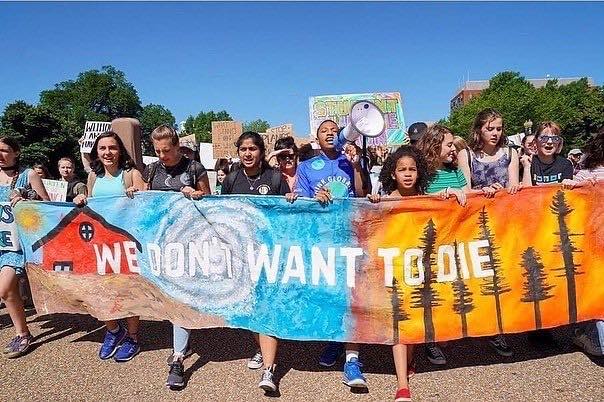Students are fighting for their planet
Students protest at the Global Climate Strike
October 16, 2019
Chants of “Do your job!” are common during climate strikes. Students, seeing that the government is not protecting their future, are seeing it necessary to put their education on hold and engage with civic action In other words, to do the job of the government themselves. Governments at all levels in the U.S. are doing horrendous jobs at moving towards carbon neutrality, and slowing down or stopping climate change and its impacts on our community. There is so much work that still needs to be done, and not nearly enough time for the pace at which it is being done right now.
The government at a federal level is almost doing the reverse of what they should be doing to combat the global climate emergency. “[The federal government is] deregulating industry, they’re weakening the Clean Air Act and the Clean Water Act,” Yerim Kone said, a self-described “foot soldier in the climate army.”
This statement largely mirrors the views of other students at the September 20 strike. Their criticisms are not confined to the federal government, though. Regarding the actions of the local government toward the climate emergency, Montgomery Blair senior Jansikwe Medina-Tayac said, “I haven’t seen enough emphasis on it. I just remember their plans being very ambitious, and them not really doing that much.” The local response, currently limited to a planning period ending in December 2020, is something that really needs to be looked at as well, because frankly, it will be the first to change. Local governments are much more in touch with their constituents, and can more accurately construct policy to meet their needs. However, much more direct action is needed, as the climate will not wait for us to catch up.
“I really think we need a local green new deal. We need every single one of our leaders to acknowledge what’s going on and support us in taking action,” Northwest High School junior Sophia Geiger said. Geiger, a national coordinator for Fridays for Future, a climate advocacy group, would know. Montgomery County’s actions themselves, however, are far from perfect, or even great. “I honestly haven’t seen too much of an emphasis on changing things,” Medina-Tayac said.
What could the government be doing that they’re not already? Education is definitely a priority. How can people collaborate and create green policy if every generation that has gone through school so far isn’t being taught adequately about this issue. “Local government, especially our school board, and school boards all around the country need to create climate change curricula that recognize and reflect on how humans have contributed and created this issue,” said Uma Fox, an RM sophomore.
Beyond education, what are some real actions Montgomery County Public Schools and our local governments could take, today even, to bolster the fight for our climate? One idea is to help students engage with the issue in the first place, giving students a set number of “civic action days”, which would allow students committed to activism excuse their school absences. Beyond these school-focused plans, government could also be doing more to make itself less reliant on fossil fuels, and more environmentally-friendly overall. “They can implement composting systems… they could implement taxes on coal production and also implement renewable energy.” Bethesda Chevy Chase HS junior Ari Ruebenstein said.
For all the “letting the youth lead” that many climate-forward members of government have proclaimed, there are very few of these great ideas being carried forward. There is a certain disparity between what is said while campaigning, and in office, in order to appease the electorate, and what is done while in that position.
Maybe that is why the youth are giving up their educations, some every Friday, to fight for their future. Because until all governments start making adequate changes, and the climate disaster starts to turn back towards progress, the fight for the future of this planet’s youth isn’t over yet. Until then, don’t expect the marches, the chants, and shouts to stop, because if there is one thing that is certain, is that this generation is fighting.



